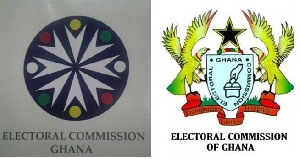- Home - News
- TWI News | TV
- Polls
- Year In Review
- News Archive
- Crime & Punishment
- Politics
- Regional
- Editorial
- Health
- Ghanaians Abroad
- Tabloid
- Africa
- Religion
- Election 2020
- Coronavirus
- News Videos | TV
- Photo Archives
- News Headlines
- Press Release
General News of Wednesday, 27 April 2016
Source: classfmonline.com
New EC logo lacks spirit – Lawyer
A private legal practitioner, Andy Appiah-Kubi, has said the new emblem of the Electoral Commission of Ghana (EC) is bereft of spirit unlike the previous logo, which bore the Coat of Arms.
The EC on Tuesday April 26, 2016, launched a new five-year strategic plan at the Best Western Premier Hotel in Accra, which, among others, saw the replacement of its logo with a new one.
The decision had set tongues wagging with many Ghanaians criticising the decision, saying the symbol lacked meaning, while others claimed the electoral body had plagiarised the logo from a Turkish organisation, a charge the chairperson of the EC, Mrs Charlotte Osei, has denied.
In an interview on Accra News on Tuesday April 26, Mr Appiah-Kubi raised issues with the new logo. He told Abena Korantemaa Agyapong that: “The old logo had an emblem that identified it with Ghana. The EC works in Ghana’s name, so, if they had an emblem bearing Ghana’s Coat of Arms, then it indicated the backing Ghana as a country gave that commission, the coat of arms identified it with Ghana”.
“Now that it [the EC] has stripped the logo of this national symbol, it has reduced the spirit backing this body. Nothing shows they are working in the spirit of Ghana. What it means is that it has become very ordinary like a private organisation. Nothing shows it has evoked the spirit of the nation. So, in my mind, it’s not in order.”
The EC boss at the launch explained that the commission took away the Coat of Arms to separate the EC from the state.
“Why did we remove the Coat of Arms? Because we do not represent the authority of the state. We are more than the ballot box; our mandate is beyond just the ballot box as we have explained. And in the research we did, the Coat of Arms does not speak to the legal and functional independence of the commission. We should not represent the authority of the state,” Mrs Osei remarked.
Mr Appiah-Kubi admitted that the reforms by the EC were within its powers, since it was an autonomous institution and could not be legally faulted, but insisted: “There is no way the new logo is an improvement on the previous one”.
He also questioned the timing of the release of the new logo, especially at a time when the election management body was grappling with financial issues and was struggling to procure enough biometric verification devices for its work.
“If you look at this limited registration, because of financial challenges, they have merged some polling stations for the exercise, placing a burden on individuals and political parties,” the lawyer added. “So, in my view, we have not set our priorities right. I do not agree with the EC.”











